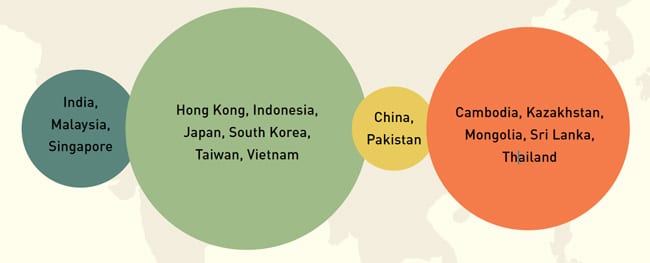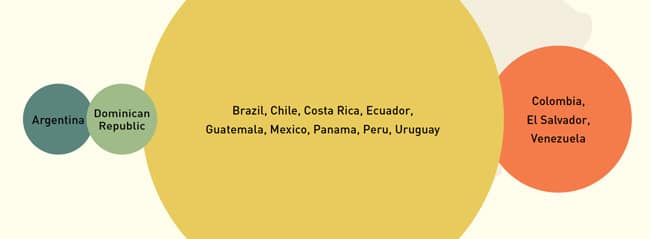Fifth annual English proficiency ranking finds Latin America on the rise
Higher national levels of English proficiency are linked to higher per capita income levels, more open and accessible business environments, improved quality of life (as measured by the United Nations Human Development Index), and higher participation rates of youth in education, employment, and training. Reflecting the importance of international communication in technology sectors, countries with higher levels of English ability also tend to have higher levels of high-technology exports, more researchers and technicians per capita, and greater spending on research and development. These are some of the key linkages advanced in the EF English Proficiency Index 2015, the 5th annual edition of the EPI released earlier this month by Education First (EF). "English proficiency is less associated with the elite, and it is not as closely tied to the United States or the United Kingdom as it once was," notes this year’s survey report.
"Instead, English is becoming a basic skill for the entire global workforce, in the same way that literacy has been transformed in the last two centuries from an elite privilege into a basic requirement for informed citizenship."
This year’s EPI ranking includes 70 countries (up from 63 last year) and is based on online language tests undertaken by 910,000 adult English language learners over 2014. EF began gathering and analysing large volumes of data in 2007 and so this year’s report has the advantage of being able to look back and track trends over several years. As we have noted of the EPI in the past, however, one necessary caution when looking at the rankings is that the EPI is not a statistically controlled study. The test subjects complete a free test online on a voluntary basis and as such, may not entirely reflect the overall English proficiency of a given country. The EPI results are therefore best understood as directional indicators of proficiency in a given country or region, but they have a number of important findings to offer in that respect. The report also makes the interesting point that, "Regions are still the strongest predictor of English ability. This ‘neighborhood’ effect is particularly strong in parts of Europe, Latin America, and the Middle East." The 2015 round-up of global "neighbourhoods" finds that:
- Europe continues to lead the world in terms of English proficiency, particularly countries in Northern and Central Europe that have seen steady gains over the past five years;
- Latin America continues to be a low proficiency region but on average English skills have improved this year;
- Asia, the world’s most populous region, shows greater variability with countries at both the high and low end of the proficiency spectrum;
- The Middle East and North Africa demonstrates low levels of English ability overall and was the only region to register declining proficiency this year.

In terms of demographic variations, the 2015 survey finds that women generally speak better English than men in every country. However, this gender gap also tends to narrow in the higher proficiency countries. The report notes as well that, "Worldwide, English proficiency levels are highest among young adults aged 18-20. However, on a global level, the difference in English ability between age cohorts is extremely small for adults under 30. On a national level, the story is quite different, with some countries showing stark generational differences and others almost none."
China and Latin America changing places
Much has been made this year of China’s move down the rankings, and the fact that a number of Latin American countries - including Peru, Chile, Ecuador, Mexico, and Brazil - have moved past China on the global proficiency tables.
As in 2014, China remains in the "Low Proficiency" band again this year but it has fallen down the ranking table, from 37th place last year to 47th for 2015. EF is quick to point out that the longer-term trends clearly indicate that China has made considerable progress in building English proficiency over the past decade. The 2015 results, therefore, may reflect more a temporary slowdown in that progress than anything else. The report adds however that, "Despite China’s investments in English training, it remains stagnant in the Low Proficiency band. With a massive population spread across urban and rural areas, it struggles to significantly improve overall English proficiency."
Within China, students in major cities such as Beijing and Shanghai had the highest test scores. Interestingly, EF also found that the proficiency of Chinese students aged 21 to 25 is lower than those aged 18 to 20 or 26 to 30.
Christopher McCormick, EF’s Senior Vice-President for academic affairs, recently explained to China Daily that the difference among age groups is due to a number of factors. "More young working professionals in China are using English than ever before and this experience is giving them a higher level," he said. "By comparison, university students have less exposure or practice, which led to a relatively lower proficiency either than younger students or working professionals."
He added that for students aged between 18 and 20, their most recent experience of English is intensive English training for exams including gaokao. But once they are in university in China, they will be focusing on their academic studies and English is less of a priority at that point.
All that said, it is important to point out as well that China’s overall proficiency score declined by less than a single point (-.74) between 2014 and 2015. The change in ranking this year may have more to do with the fact that several new countries have been added to the survey and several others, notably in Latin America, have demonstrated higher proficiency scores for 2015.
EF says of the region, "Latin America has been on a positive trajectory since 2007…Of the 14 Latin American countries featured in this index, all but one has improved since last year…In recent years, policymakers and economists in Latin America have made education reform a top priority for advancing economic development. In 2014, several countries launched national initiatives for improving English language teaching in public schools."



















